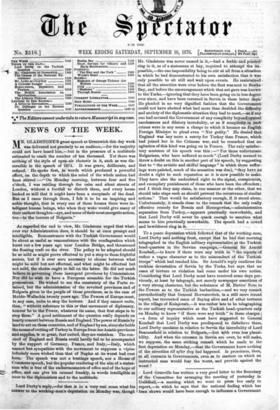To a peace deputation which followed that of the working-men,
Lord Derby said nothing fresh, except that he had that morning telegraphed to the English military representative at the Turkish head-quarters in the Servian campaign,—General Sir Arnold Kemball,—to know if there were any truth in "the reports of rather a vague character as to the misconduct of the Turkish troops" which had reached him. Sir Arnold's reply confirms the reckless devastation of Servia by the Turks, but says that no cases of torture or violation had come under his own notice. Considering that Lord Derby must have received some days pre- viously, at least by telegraph, not merely newspaper assertions of a very strong character, but the substance of M. Ristics' Note to the Powers as to the Turkish barbarities,—and we may remark parenthetically that General Horvatovitch, in a still more recent report, has recounted cases of flaying alive and of other tortures in the village of Kniajevatz,—it was rather late to be telegraphing to our military representative at the Turkish head-quarters only on Monday to know "if there were any truth" in these charges ; —a form of inquiry which must have suggested to General Kemball that Lord Derby was predisposed to disbelieve them. Lord Derby emulates in relation to Servia the incredulity of Lord Beaconsfield in relation to Bulgaria,—but with even leas plausi- bility. And when the excesses in Servia are over, he will make, we suppose, the same striking remark which he made to the first deputation on Monday,—that the Government knew nothing of the atrocities till after they had happened. Is prescience, then, at all common in Governments, even as to matters on which an instructed man would fear the worst, and provide against the worst ?






























